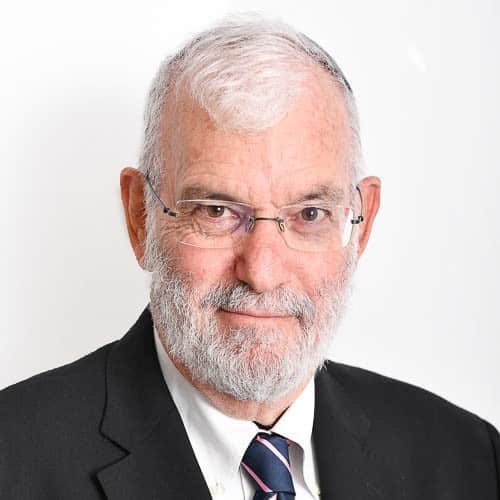General Amidror: “Declaring Israeli sovereignty over the Golan won’t help us in acting against the Iranians, but it won’t stop us from acting against the Iranians.”
The Jerusalem Post, 11.01.2019
![]()
BY ANNA AHRONHEIM
It’s been almost three weeks since US President Donald Trump unexpectedly announced that he would be withdrawing American troops from Syria. In Israel, there has been much speculation as to whether the pullout will open the door for Iran to solidify its land bridge to the Mediterranean.
For the past four years, outgoing IDF Chief of Staff Lt.-Gen. Gadi Eisenkot has been working to prevent Iran’s expansion in the Middle East and entrenchment in war-torn Syria. It was his biggest challenge as the military’s top officer.
He expanded Israel’s “war between the wars,” overseeing countless operations beyond the borders of the Jewish state to prevent Iran from realizing its goals and to stop it from strengthening its Shi’ite proxy in Lebanon, Hezbollah.
According to the Missile Threat website of the Center for Strategic and International Studies in Washington, Hezbollah’s arsenal of rockets and missiles has greatly increased since the last war between the group and Israel – from 15,000 rockets and missiles to 130,000.
While the majority of the arsenal comprises short- and medium-range surface-to-surface, antitank and antiship missiles, “Hezbollah is the world’s most heavily armed non-state actor, and has been described as a militia trained like an army and equipped like a state,” the report concluded.
Although the IDF has said that it struck Gaza a total of 865 times over the past year in response to the firing of rockets toward southern Israel, the majority of operations by the Israel Air Force has been against targets in Syria.
It’s because of those strikes against Iran and Hezbollah in Syria that the Shi’ite terrorist group has not been able yet to fulfill its goal of obtaining a large amount of precision missiles from its sponsors in Tehran.
And while Iran’s presence and capabilities on the Golan Heights has decreased significantly, now that Trump has announced that American troops will withdraw from the region, concern has grown in Israel, with Prime Minister Benjamin Netanyahu calling for Washington to recognize Israel’s sovereignty over the strategic Golan Heights as compensation.
Yaakov Amidror, a former IDF major-general, who is the Anne and Greg Rosshandler Senior Fellow at the Jerusalem Institute for Strategy and Security and a Distinguished Fellow at the Jewish Institute for National Security of America’s Gemunder Center for Defense and Strategy, told The Jerusalem Post that while declaring Israeli sovereignty over the Golan Heights is an Israeli interest, it is not connected to the IDF’s operations against the Iranians.
“Declaring Israeli sovereignty over the Golan won’t help us in acting against the Iranians, but it won’t stop us from acting against the Iranians,” he said Wednesday night.
In August Russia’s TASS news agency quoted a Russian envoy as saying that Iranian forces had withdrawn their heavy weapons in Syria 85 km. from Israel’s Golan Heights, and according to Amidror, while there are no more Iranians or Iranian facilities “formally” on Syria’s Golan Heights, their militias can still be found “here and there.”
“The Iranians understood a long time ago that this is a redline for us, and anyone who tries is taking a risk,” he said, adding that Tehran knows that Israel is very determined to enforce its redlines.
“In every previous attempts by the Iranians and Hezbollah to build launching pads in the Golan Heights, our actions were very clear, and even the Russians understand that this is a very sensitive point and that they should not allow Iranians to come to close to Israel.”
With the help of Russia, Iran and Hezbollah, Assad has regained control over the majority of Syria and is rebuilding his army, focusing first on intelligence and air defense divisions, which could pose a threat to Israeli aircraft.
Russia, which over the course of its time in Syria during the civil war has respected Israeli security interests, has installed new air defenses in Syria, which, while currently manned by Russian troops, do pose a threat to Israel.
Despite a tacit agreement not to meddle in Israeli operations against Iranian or Hezbollah targets, it is not far-fetched to imagine a scenario in which Russia changes its minds and allows Syrian troops to man the advanced air defense systems. According to Amidror, it is only a matter of time before the Russians hand over control of the systems to the Syrians.
“Politically, it’s a big difference between Russian-manned anti-air systems and Syrian-manned systems, but militarily it doesn’t matter,” he said. “From the Israeli point of view, it’s a technical question; because if it is in our interest and need, and the decision is taken in Jerusalem, for us it doesn’t matter if it’s the Russians or Syrians. But what we have to do is to have the ability to use the capabilities we have to stop the Iranians.”
According to foreign reports, Israel has trained to outmaneuver the S-300 air defense system Russia deployed to Syria. Israel also has the stealth F-35 fighter jet, which has already seen action over the skies in the Middle East.
“The Russians understand the need of Israel to defend itself,” Amidror said, adding that “even if they don’t like it or agree with it, they understand that Israel has the right to defend itself by not letting the Iranians build an independent war machine in Syria.”
So it is likely that Israel will continue its operations against Iran and Hezbollah on the northern front, whether that be in Lebanon, Syria or western Iraq.
“There is a difference between Syria and Lebanon,” Amidror said, and while the IDF has “kept our freedom to act in Syria, we didn’t build this freedom to act in Lebanon, and this is one of the most problematic decisions which might be taken in the future as to how to deal with Iran and Hezbollah in Lebanon.”
American National Security Adviser John Bolton, who was in the region this week to reassure Washington’s allies, maintained that there is no fixed timetable for the withdrawal, and that some 200 American troops will remain in the vicinity of the Tanf base to counter Iranian activity.
The withdrawal, Bolton said “would be carried out in such a way as to “make sure that the defense of Israel and our other friends in the region is absolutely assured,” but Israeli defense officials are not so sure, and have said that the Americans will not remain in the Tanf base, which borders Iraq.
Tanf would be a strategic crossing point for Iran’s land bridge, should the Americans leave.
Nevertheless, it is not critical for Israel that there be American boots on the ground in Syria, as long as the IAF retains its freedom of action there. But with the regime of Bashar Assad consolidating its grip of the country, the window of opportunity to continue striking is closing, and the IDF knows that.
The Jerusalem Post, 11.01.2019






 - בניית אתרים
- בניית אתרים